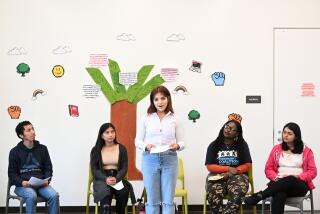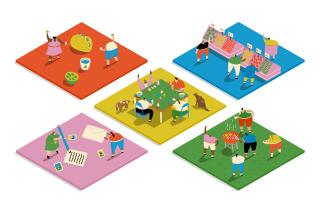Why we’re all getting to know ourselves a little better in quarantine

- Share via
All this time at home has a side effect: a chance to learn more about ourselves and the people quarantining with us.
The coronavirus shutdown has upended most of our daily routines. Most of the things that were keeping us occupied suddenly ceased to exist. Commutes are canceled. So are our social lives. Suddenly, those of us who aren’t essential workers are spending almost all of our time at home. This has created opportunities for self-discovery: being able to look inward and learn new things about yourself.
For some, the stay-at-home orders became an opportunity to get to know both themselves and their partners in a new way. For others, it was a chance to be truly together for the first time.
Faith Colburn and Lauren Pulido were going to take it slow. The longtime friends had just admitted in late February that they had feelings for each other. Pulido had broken up with his girlfriend and moved home to a duplex he shares with his mom and grandmother in Sacramento two weeks earlier. They wanted to feel out this new phase, go on dates, be together in a romantic way for the first time.
“We’re like, let’s not jump into this. I don’t feel a need to rush,” Colburn said.
The same afternoon they had that conversation about taking it slow, the stay-at-home orders were issued. It was a Friday. Starting Monday, they wouldn’t be able to see each other.
They made a snap decision: Never mind taking it slow. Let’s quarantine together.
Colburn packed her things and moved into the duplex with Pulido’s family, which also includes two dogs and a cat.
That was six weeks ago. Now, they’re navigating changes at work — both work for the state government — on top of the major change in their personal lives. It’s been an unprecedented chance to get to know each other in new ways.
“Something I already knew but was confirmed is how fundamentally kind he is,” Colburn said. “I’ve seen his heart.” Pulido, who knew Colburn for her “strong, independent” streak, is learning about a different side, a softer one, especially as he has started taking testosterone in February as part of the hormonal transitioning process. “Faith has been such a great supporter in allowing me space to find myself during this whole experience.”
Ready, set, reframe: Instead of stressing out about coronavirus and the shutdown, let’s use this time of social isolation to prioritize self-care and mental wellness.
Obviously not everyone will fall deeply, madly in love with their best friend during quarantine. But it’s not only new couples who are learning things about each other.
Steve Adams and his wife, Rebekah, celebrated their 37th wedding anniversary this week.
He works as a triage nurse at the Keck Hospital of USC, which means he’s still going in to work. His wife is a consultant for the funeral industry and is able to do her job from their home in Pacoima. Normally, they spend weekends going to bars and restaurants and sporting events with friends; quarantine has forced them to slow down on their social lives and spend more time on domestic pursuits. He said even after almost four decades together, they can still surprise each other — and themselves.
“I always knew she had it in her, but she’s discovered she can cook and actually cook pretty well,” he said. Prior to this, he usually volunteered to cook while she did dish duty. He said he’s learned things about himself too, like that he enjoys doing art projects in the backyard.
The key to quarantine success, he said: Treat your spouse like your teammate.
“If you’ve ever played sports, don’t be a jerk to your teammates. I think that applies to marriage too,” he said. He’s had excellent, if inadvertent, teachers on that front: “My dad was married four times and my mom was married three times, so I learned a lot about what not to do in a marriage from my mom and dad.”
Ryan Howes, a clinical psychologist in Pasadena, said he’s seen his clients make breakthroughs during this shutdown time: Self-described introverts realize how much they rely on socializing, while social butterflies enjoy their newfound quiet time. Finding ways to fill the extra time has also led to some joyful discoveries: Maybe you’ve found you love baking, gardening or watching obscure YouTube videos with your kid.
If you haven’t felt an inner “a-ha” moment yet, Howes said there are ways to help the process along. Guided meditation is a good way to look inward, as is keeping a journal.
“It can be a few words or a ‘Dear Diary’ thing, but that is an excellent way for people to really clarify their thoughts and put them down in a way that they can understand and even look back on later, which I think is why people are really talking about journaling” right now, Howes said. “People really want a record of this.”
The shutdown situation can be uniquely hard on married couples. Here’s how to help your marriage survive coronavirus.
Revisiting old journals is one of the ways Vivi Le realized just how much she’s changed. Le, a recent UCLA graduate who lives with her sister and mom in L.A.’s Chinatown neighborhood, said before the shutdown she was working multiple jobs while trying to get her acting career off the ground. Now, she has a chance to check in with herself and look through old diaries and photos from her teenage years. Back then, she would have described herself as self-confident, but her diary entries reveal someone full of anger, sadness and self-hatred. That’s changed.
“Now in quarantine, I’m more alone than I was in high school, I feel more happy, I’m full of hope and joy, and so much more optimism. It’s made me realize how much I’ve grown,” she said. “Me at 19 would never believe I’d ever be able to feel this way.”
She said both she and her mom, who was born and grew up during the Vietnam War, find themselves oddly prepared for this unique moment. She said America’s go-go-go productivity culture gave her the chance to dream big about her life — something she said she felt like her relatives in Vietnam never got — but it also initially made her feel worthless for not being more “productive” during this time. She pushed past it and moved into a phase of gratitude for what she has. Her mom, meanwhile, had always kept lots of supplies like toilet paper and canned food on hand in anticipation of some big emergency that never seemed like it was going to happen — until now.
“I thought she was going to freak out more. She’s seemed very anxiety-prone and waiting for something to happen, but when this happened she was so calm,” Le said. “She wasn’t anxious at all. I think I understand why. She’s been ready.”
Many people are reporting more vivid dreams while self-quarantining, taking to social media to comment on the phenomenon.
Some people have discovered this time is a chance to get to know the people they can’t be with. Regina Chow Trammel is an associate professor of social work at Azusa Pacific University. Teaching over Zoom has created a chance to do something she’s never been able to do: see inside the daily home lives of her students, many of whom she said are first- or second-generation Latinx immigrants.
“I didn’t realize that some of them were literally caring for siblings or even financially” supporting them, she said. “I’ve heard these stories, but it’s another thing to see the activity in the home, to hear the background noise of their siblings talking to them or just what they were balancing. ... I think you know it intellectually, but when you experience something it goes deeper.”
As a mindfulness researcher, she’s used this time to check in with herself and come up with a new framework for what success looks like. Her teaching mantra has changed from pushing her students to work harder and achieve more to compassion and acceptance for where everyone is right now. That includes for herself: Things that she used to enjoy, like shopping for groceries at 99 Ranch, are now regimented and exhausting. She said she can’t expect herself or her students to be at their most productive when day-to-day existence has become such a challenge.
“Thriving is going to look different. I think we can flourish” in new ways, she said. She offered a metaphor: We just have to treat ourselves like plants.
“We need some sun, we need to breathe fresh air, we need a nap. That’s the best we can do. Be like plants. Grow where you’re planted. Drink lots of water. Bend towards the light.”
More to Read
Sign up for The Wild
We’ll help you find the best places to hike, bike and run, as well as the perfect silent spots for meditation and yoga.
You may occasionally receive promotional content from the Los Angeles Times.












